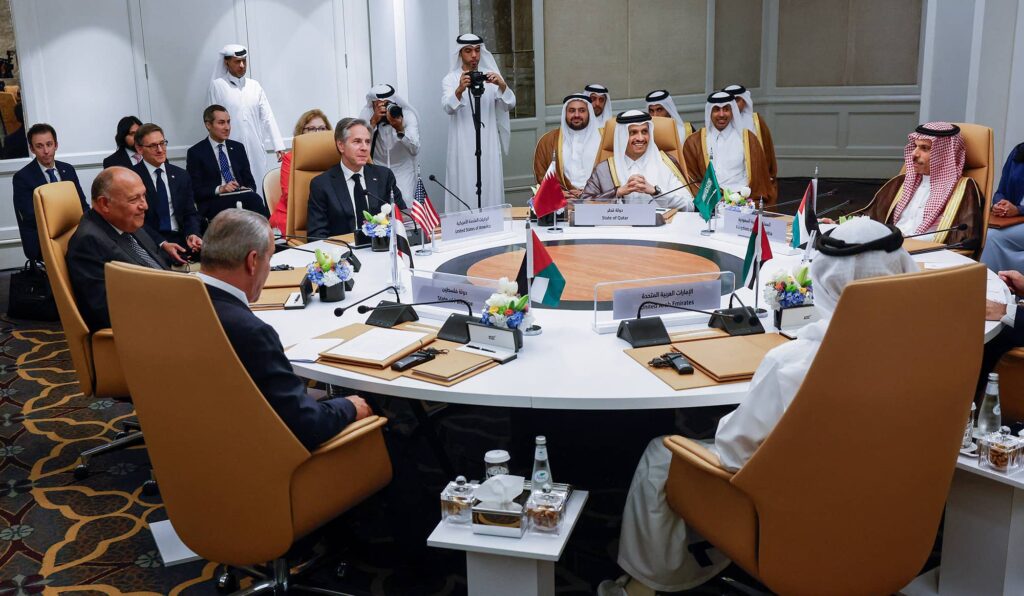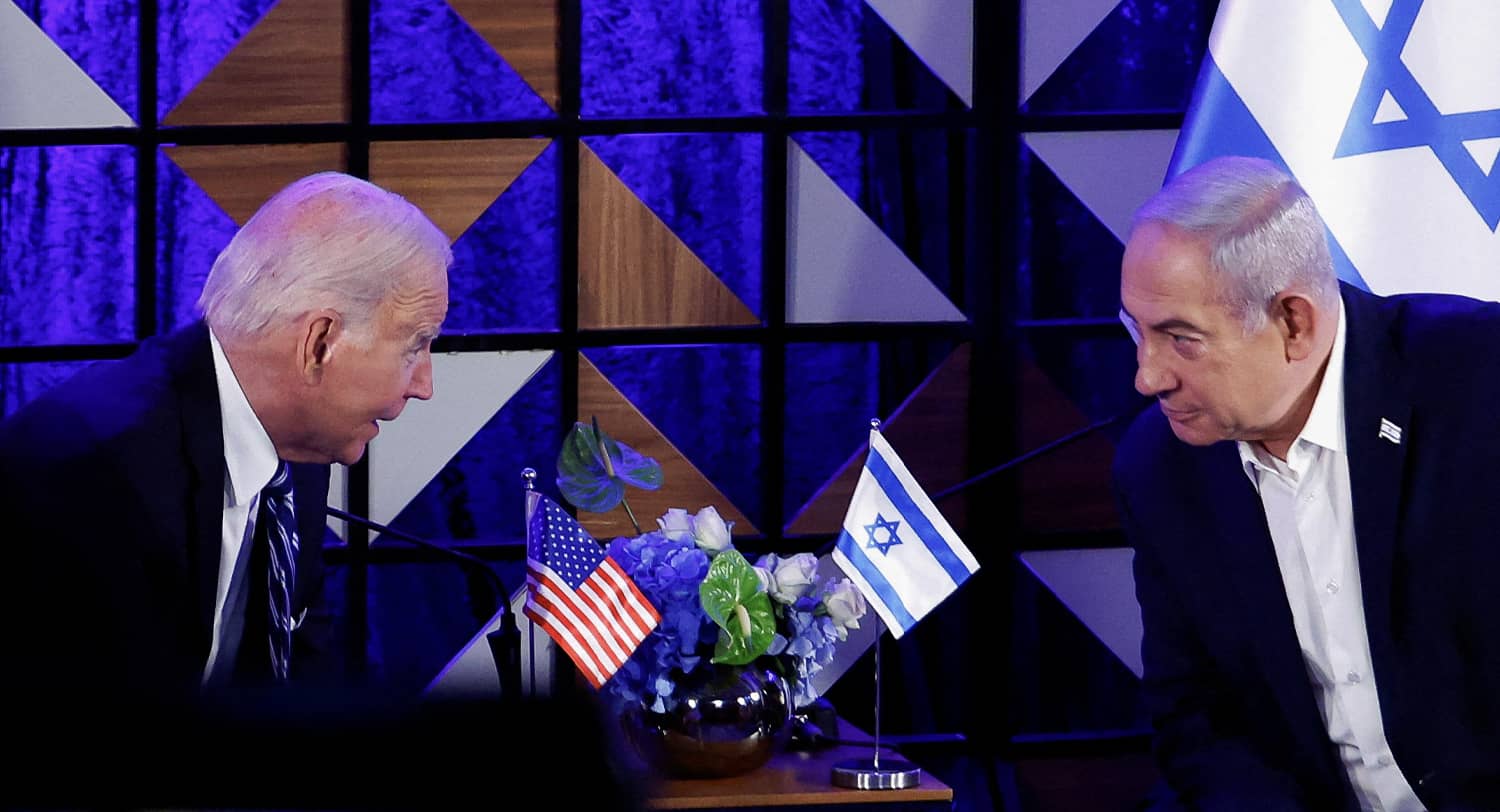Israeli Prime Minister Benjamin Netanyahu will address a joint session of Congress on July 24 at what promises to be an historic and controversial moment.
Netanyahu’s speech allows him to “share the Israeli government’s vision to defend its democracy, combat terrorism and establish a just and lasting peace in the region,” said House Speaker Mike Johnson and Senate Minority Leader Mitch McConnell in a joint statement.
A significant number of Democratic lawmakers are considering a boycott of Netanyahu’s speech, with the war in Gaza increasingly unpopular among progressives. But Democratic leaders will not join the boycott. “[B]ecause America’s relationship with Israel is ironclad and transcends a single person or prime minister, I have joined his request to speak,” said Senate Majority Leader Chuck Schumer, the longest-serving Jewish lawmaker in Congress.
With more than a month to go before Netanyahu’s speech, questions are whirling. In the coming days, Hamas is expected to respond to the proposed deal backed by the Biden administration and supported by several European countries, which may result in a definitive end to the war.
If Hamas rejects the peace deal, that could mean that the war will be approaching its tenth month by the time Netanyahu speaks in Washington. If Hamas accepts the deal, and Israel agrees, the war may be over when Netanyahu lands in D.C.
Meanwhile, the Biden administration faults Hamas for the failure of previous peace proposals, while some Democrats say their patience with Israel has diminished due to the humanitarian crisis in Gaza.
Without a breakthrough, on the ground or at the negotiating table, Netanyahu could find a much more polarized crowd at the Capitol in July.
The near unanimous support of the world for Israel following the unspeakable massacres of October 7 – when more than 1,000 civilians were murdered and mutilated and some 250 raped and taken captive — is dissolving by the day.
Isolation is already hurting ordinary Israelis. Some airlines haven’t resumed service to Tel Aviv; some American and European institutions have announced that they are suspending exchanges of students and researchers with Israeli institutions and that they will not negotiate any new agreements.
Karim Khan, chief prosecutor of the International Criminal Court, is seeking arrest warrants for Prime Minister Netanyahu and Defense Minister Gallant (along with Hamas leaders). Despite the US Congress voting to impose sanctions against members of the International Criminal Court, the damage is done. Netanyahu’s reputation is tarnished. Israel, as a democratic state, must be worried.
Israelis view this situation with growing frustration. They don’t understand why the world doesn’t see them as victims of a barbaric attack by an organization that is designated by most of the Free World as a terrorist organization. The Israeli leadership’s failure to offer a credible vision of the future and a way forward for the country is hurting the Israeli public.
The Biden administration, whatever criticisms may be made of it, is exercising leadership by pressuring Hamas and all the countries that have influence on this organization.

Hamas could end this war today. They could release the hostages, abandon their promise to annihilate Israel, and stop holding the Palestinian population hostage to their religious fantasies. This would end the war and safeguard the innocents on both sides.
Thus, the status quo is a disaster not only for Israel but for the entire region.
Israeli leaders must admit that the slogan of “total victory” is impossible to achieve alone, without clear international and regional support. Real victory involves first, release of the Israeli hostages from the hands of the terrorists. On June 8, the Israeli army freed four hostages: Noa Argamani, Andrey Kozlov, Shlomi Ziv and Almog Meir. This is good news for Israel and for the hostages and their families. However, this should not be used tactically by Netanyahu to impose his unrealistic vision of continuing the war, weaken his political opponents and maintain his ruling coalition for as long as possible.
The price will be heavy and unbearable for everyone.
For the Biden administration this happy news of hostage rescue comes with a bitter taste, since it cost the lives of dozens of Palestinian civilians and may result in Hamas’ refusal to agree to Americans plans to cease fighting and free the remaining hostages.
In the meantime, the White House must carry out its threats to arrest and try the external leaders of Hamas – Ismail Haniyeh, Khaled Meshaal and others –and freeze their assets. Many Hamas leaders are billionaires with large holdings overseas. Hamas must be dissolved both inside and outside of Gaza. For this, the US and European countries will be most vital.
At the same time, we must articulate a postwar vision for Gaza not involving the return to control of the Palestinian Authority, which lost Gaza to Hamas in 2006 and made no real effort to regain control in the 18 years since. Instead, a new Palestinian government should be empowered to keep armed militias at bay and ensure the orderly administration of education, health care and other public services.
Israel’s northern border with Lebanon must be secured by imposing more sustained sanctions against Hizbullah, forcing it to withdraw from the Israel border and creating a buffer zone inside Lebanon. The same goes for Gaza’s Rafah crossing, where Egypt could play an important role in exchange for greater financial support. This can only be done with Egyptian institutions, a partner in peace with Israel, let us not forget.
The US must define a pragmatic but firm strategy against the Iranian regime, the primary funder of Hamas. Israel will not be able to tackle this monster alone. The international community must assume responsibility.
Let’s remember the young generation of Palestinians who find themselves trapped and held hostage by unfortunate circumstances that they did not choose. Palestinians want to live in peace, with dignity. That means schools, hospitals, jobs, fair elections, and the freedom to build their own futures and chase their own dreams.
All of these things must come before even the idea of a Palestinian state. To establish a new state in a sustainable manner will require Palestinians to retake their destiny from extremist ideas and nihilistic propaganda, to build lasting and unique institutions that fit their needs.
It is the only path that leads to peace and prosperity in the Middle East.

